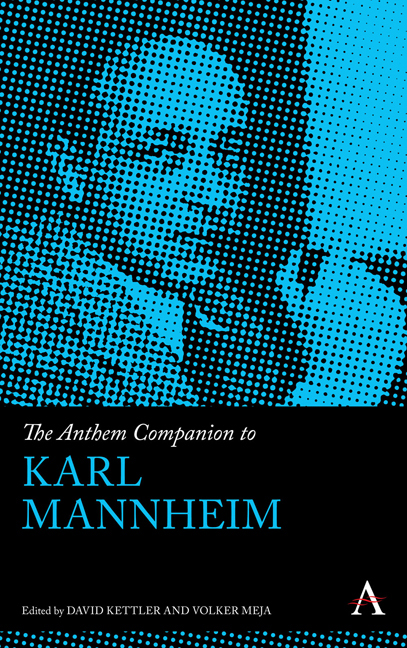Book contents
- Frontmatter
- Contents
- Introduction: Karl Mannheim as Interlocutor
- Chapter One Between Ideology and Utopia: Karl Mannheim's Quest for a Political Synthesis
- Chapter Two Karl Mannheim and the Realism Debate in Political Theory
- Chapter Three Mannheim, Mass Society and Democratic Theory
- Chapter Four Karl Mannheim and Hannah Arendt on Conduct, Action and Politics
- Chapter Five Karl Mannheim and Women's Research
- Chapter Six The Melodrama of Modernity in Karl Mannheim's Political Theory
- Chapter Seven Historicization and the Sociology of Knowledge
- Chapter Eight Karl Mannheim, T. S. Eliot and Raymond Williams: Cultural Sociology or Cultural Studies?
- Chapter Nine Karl Mannheim's Sociology of Self-Reflexivity
- Chapter Ten Praxeological Sociology of Knowledge and Documentary Method: Karl Mannheim's Framing of Empirical Research
- List of Contributors
- Index
Chapter Six - The Melodrama of Modernity in Karl Mannheim's Political Theory
Published online by Cambridge University Press: 10 May 2018
- Frontmatter
- Contents
- Introduction: Karl Mannheim as Interlocutor
- Chapter One Between Ideology and Utopia: Karl Mannheim's Quest for a Political Synthesis
- Chapter Two Karl Mannheim and the Realism Debate in Political Theory
- Chapter Three Mannheim, Mass Society and Democratic Theory
- Chapter Four Karl Mannheim and Hannah Arendt on Conduct, Action and Politics
- Chapter Five Karl Mannheim and Women's Research
- Chapter Six The Melodrama of Modernity in Karl Mannheim's Political Theory
- Chapter Seven Historicization and the Sociology of Knowledge
- Chapter Eight Karl Mannheim, T. S. Eliot and Raymond Williams: Cultural Sociology or Cultural Studies?
- Chapter Nine Karl Mannheim's Sociology of Self-Reflexivity
- Chapter Ten Praxeological Sociology of Knowledge and Documentary Method: Karl Mannheim's Framing of Empirical Research
- List of Contributors
- Index
Summary
“Melodrama” as a descriptive concept—in contrast to a pejorative understanding—expresses a typically modern form of experience as radical immanence of human and political life and therefore seems appropriate to get to the depth of Karl Mannheim's critique of modernity as the loss of any metaphysical system from, or on which, knowledge and knowledge claims could be derived or based. An analysis of his modernity critique as melodrama presents a reading of Mannheim that goes deeper and beyond his reception as a sociologist of knowledge: his sociology of knowledge appears then “only” as a consequence to found knowledge under non- metaphysical, nonreligious, or non- idealist, that is, contingent conditions (of modernity) by relating styles of thought to social and historical contexts and standpoints (“Standorte”) from where they originated and in which they are functioning. Mannheim argues against any attempt to restore metaphysical systems, and he does not regret the loss of transcendence and metaphysics, but rather opens knowledge and political action to anti- essentialist (ideology) critique and to plurality. We see herein seeds for the development of a political theory of optionality.
The Problematic and Structure of the Chapter
In the present chapter we discuss Karl Mannheim's notion of modernity alongside the question of what we can learn from this for political theory. This discussion, of course, touches upon Mannheim's most famous approach, namely his sociology of knowledge. In doing so, this chapter will, however, understand his sociology of knowledge not as something independent, historically spatially non- relational and itself noncontingent, but rather as a consequence of his understanding of modernity, having the character that Mannheim ascribes to every (other) social and political theory. More concretely: Mannheim's understanding of modernity demands a radical immanent conceptualization and explanation of knowledge, as all metaphysical and transcendental claims would have become impossible. The only way to approach knowledge, therefore, is to understand knowledge as deeply anchored and rooted in society and in sociohistorical contexts (“Standorte”). Mannheim's sociology of knowledge is thus a radical accommodation of sociological and political inquiry to conditions of modernity (as he viewed it; see below), that is, of the immanence of social and political life and subsequently of their analysis and of all action within it and without reference to metaphysics and/ or religion.
- Type
- Chapter
- Information
- The Anthem Companion to Karl Mannheim , pp. 117 - 136Publisher: Anthem PressPrint publication year: 2017



